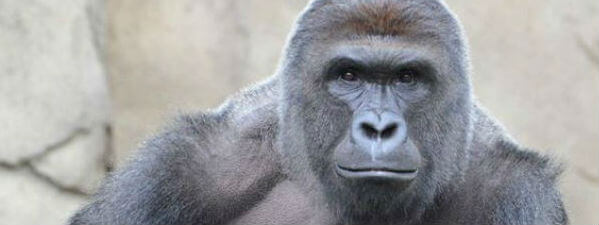
“The killing of a gorilla at the Cincinnati Zoo in order to save a child who fell in its enclosure has sparked nationwide outrage,” reports CBS News.
I share the outrage.
I happen to be among those who believe that the incarceration of wild animals for the entertainment of sightseers, cannot be justified. It does little to elevate the consciousness of the people and even less the well-being of the captives. The protection of endangered species requires first and foremost the protection of endangered habitats.
Upon seeing the news of the gorilla’s death, like many others, I also thought that if a four-year boy could even get into a situation like this, there had to be negligence on the part of parents, bystanders, and/or the zoo operators. Likewise, the decision to shoot and kill the 17-year-old gorilla, Harambe (a Swahili name which means, “all pull together”) seemed very questionable.
Among the outraged voices showing up on Facebook, the most venomous attacks have been directed at Michelle Gregg, the boy’s mother.
The crappy mother should have gotten shot instead, not the poor innocent gorilla!
Michelle Gregg says, “God protected my child until the authorities were able to get to him.” No, Harambe protected your child after you & God failed to stop him from climbing into the enclosure! And innocent Harambe ended up dead for his efforts, shot with a bullet that would have been better spent on you, for failing to look after your own child and being the cause of all this!
The creator of a Facebook page, Justice For Harambe (which has already received over 60,000 likes), propagated the claim that Gregg was planning to sue to zoo, and yet when asked to support this claim with some evidence simply said: “Educated guess.” The page’s stated objective is: “We wish to see charges brought against those responsible!!”
The outrage directed at Gregg has prompted a smaller wave of outrage coming from those who underline the fact that even when under the supervision of the most attentive of parents, small children do have a talent for slipping out of sight.
Meanwhile, the United Nations refugee agency announced on Sunday that at least 700 people are believed to have drowned in the Mediterranean this week as tens of thousands of refugees continue to seek safety in Europe.
The latest chapter in the worst humanitarian crisis since World War II has prompted very little outrage on this side of the Atlantic.
For observers of social media in the U.S., it’s hard to avoid concluding that the life of a gorilla is commonly regarded here as being more precious than the lives of countless human beings.
Although to some extent it’s heartening that this much concern is being shown about the premature death of a gorilla, it’s disturbing that over the last year and longer there has been such widespread indifference shown towards millions of people in desperate need.
Is there really such a compassion deficit in America, or does this reveal more about the psychology of rage?
My guess is that among those now seeking justice for Harambe, prior to this weekend many had not paid a great deal of interest in the welfare of western lowland gorillas.
The guiding emotions here were outrage at what seemed like the unnecessary loss of an innocent life, and a certain sympathy with fellow primates which all children feel and most adults have learned to sublimate.
The great apes fascinate us because on some level we recognize them as kin. We don’t just look at them; we see them with reflective awareness looking at us.
Yet why would a sense of kinship be able to extend outside our own species while falling short among other members of the human race?
What is at play here seems to have less to do with who or what we identify with than it does with the pathways that facilitate our connections.
It turns out that in the age of social media, outrage has become such a potent force because it allows strangers to bond.
Teddy Wayne writes:
A 2013 study, from Beihang University in Beijing, of Weibo, a Twitter-like site, found that anger is the emotion that spreads the most easily over social media. Joy came in a distant second. The main difference, said Ryan Martin, a psychology professor at the University of Wisconsin, Green Bay, who studies anger, is that although we tend to share the happiness only of people we are close to, we are willing to join in the rage of strangers. As the study suggests, outrage is lavishly rewarded on social media, whether through supportive comments, retweets or Facebook likes. People prone to Internet outrage are looking for validation, Professor Martin said. “They want to hear that others share it,” he said, “because they feel they’re vindicated and a little less lonely and isolated in their belief.”
Harambe’s death pulled strangers together in their shared anger. The sad and stern face of a silverback resonated across a population which, struggling to find common ground through things we can affirm, finds it much more easily in our discontent.


A valuable article with insights that might help people on social media who seem to be spinning themselves into enough hot rage to spontaneously combust. Any way to get this article on the front pages of all the newspapers and all tv news shows every day for at least a week? No kidding.
Kate – thanks for your comment. If I knew how to get that kind of mass coverage I probably wouldn’t be blogging!
Meanwhile, I have a more modest hope: that anyone who appreciates something I’ve written, shares it with others.